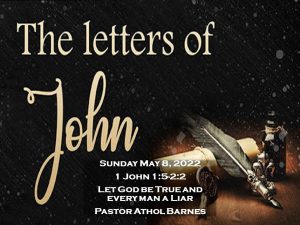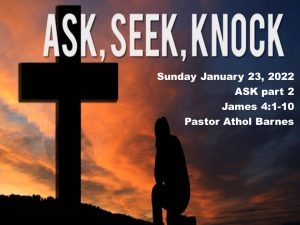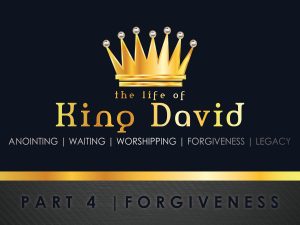
The number one problem in the world today is that humanity has a sin problem, and it affects everyone. But not everyone agrees with this assertion.
Today, we don’t hear people call sin for what it is. Sin is labelled an error of judgment, a mistake, a bad decision, etc. In fact people go to great lengths to rationalize or hide their sin.
But we must understand this basic truth, to deny sin is to call God a liar and question His character. In this passage, John uses the word “sin” nine times, and two times he will use the word “darkness.” To think correctly about Jesus, we must think correctly about sin.
In verse 5 we are reminded that we have good news, and it is a message that the world needs. This message concerns Jesus Christ, “the Word of life”. When we meet Jesus as our savior, our assignment is to take this message to the whole world. According to the JoshuaProject.net there are 7,418 unreached people groups who are yet to hear the Gospel.
A key component of the Gospel message is to convey an understanding of the nature and character of God. This is a constant theme of John’s writing.For example, he teaches us that; God is light (1:5), God is love (4:8, 16), and God is true (5:20).
In 1 John the statement “God is light” means God has as His very nature and being the source of life. Martin Luther said, “There is no darkness in Him, not even the slightest”.
This is a message that we must passionately share with the world.
But our message must also include what God says about sin. The essence of sin is our attempting to take the place of God. We want to be in charge. And we want to provide our own definitions of what is right and wrong.
John is not interested in human opinions on the matter of sin. He uses three “if we say” statements to lead his readers to understand sin. He says we are prone to lie to others, lie to ourselves and ultimately call God a liar.
1: Do Not Lie to Others (1 John 1:6–7)
John writes in 1 John 1:6, “If we say we have fellowship with him while we walk in darkness, we lie and do not practice the truth”.
If we say we have fellowship with God, but are walking in spiritual darkness, we are lying. We say to others, “I know God,” but our beliefs and behavior contradict our words. We lie to others about who we are.
In contrast, verse 7 says that if we live our lives in the realm of light, as God is in the light, our fellowship with one another is authentic and the blood of Jesus, His Son, keeps on cleansing us from all sin.
2: Do Not Lie to Yourself (1 John 1:8–9)
Verse 8 says, “If we say we have no sin, we deceive ourselves, and the truth is not in us.”
Those who live in death and darkness do not just lie to others, and eventually they lie to themselves. They lose their moral compass, and their conscience is seared (1 Timothy 4:2).
If we claim to be sinless, a declaration that we are free from the guilt and penalty of sin, we are deceived, and the truth is not in us. The truth is a person, if we say we have no sin, we really have no relationship with Jesus.
John then follows up with one of the greatest verses in the Bible, verse 9, “If we confess our sins, he is faithful and just to forgive us our sins and to cleanse us from all unrighteousness”.
John writes that there are two kinds of people
- There are some who cover and conceal their sin. They are liars.
- There are also confessors who acknowledge and admit their sin. They are forgiven.
John is not saying that we need to be perfectly sinless as that is impossible. We need an advocate who can forgive us.
3: Do Not Lie about God (1 John 1:10)
John makes the case that we can lie to others about our sin, we will then lie to ourselves and ultimately, we will actually call God a liar. Verse 10, “If we say we have not sinned, we make him a liar, and his word is not in us.”
Moving on to 1 John 2 verses 1 and 2, the world must know what God says about Jesus.
Jesus Is Our Advocate (1 John 2:1)
John has made it clear that in this life we cannot be sinless. However, he does believe we can sin less because we are now in intimate fellowship with the Father and His Son, Jesus Christ.
We all still sin, but we have the amazing promise of 1 John 1:9. In verse 1, John tells his readers to run to our savior, our advocate to the Father. This advocate is sinless, undefiled, and spotless in his nature and in all his actions. There is no one else like him.
The word “advocate” means helper, who comes alongside in a time of need. This helper is the cleanser of sin (1:7), the forgiver of sin (1:9), and the helper when we do sin.
We have this misconception that when we sin, Jesus turns away from us and leaves us because we have disappointed him. Nothing could be further from the truth. Jesus is drawn to us when we sin, he cares for us and knows that our sin leads to pain. He comes near to prevent us hurting ourselves further.
Jesus Is Our Atonement(1 John 2:2)
Jesus can be our advocate, because he has made propitiation, an atonement for our sins.
The word “propitiation” is a very important word that carries the idea of satisfaction. Jesus Christ, by His sacrifice on the cross, satisfied God’s holiness and turned away His righteous wrath from sinners.
The work of atonement accomplished by Christ on the cross is where God’s holiness and God’s love meet. (See Isaiah 53:10 and Philippians 2:9).
How do you stand before God today? Are you lying to those around you? Are you lying to yourself? Are you calling God a liar?
Jesus offers right standing before God, his forgiveness is instant and paid for.







